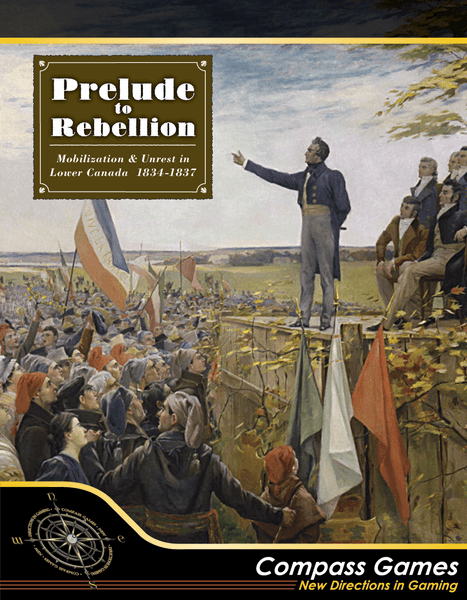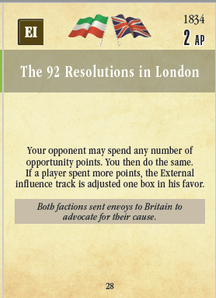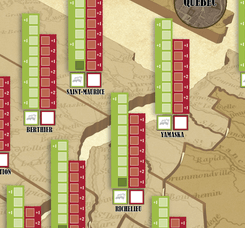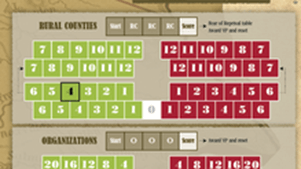
Folks Mike Willner delivers another compelling over view of Prelude to Rebellion from Compass Games [Review copy provided to Mike]
Introduction:
In 1837 in Lower Canada, long-standing resentments and frustrations of the primarily rural French Canadian population boiled over into armed rebellion. Years of heated rhetoric, fevered politicking, local organizing, arrests, and skirmishes were over. The People would no longer abide the Crown-appointed Governor and Upper House running roughshod over their desire for political reform. Hastily assembled militia and volunteer corps clashed with the regular troops of the British colonial government … and were crushed almost immediately.
Now, go ahead … ask any 10 wargamers “What do you know about the 1837 rebellion in Lower Canada?”. When I did one afternoon at Metropolitan Wargamers of NYC (www.nycwargames.com) the answers ranged from “Whahh???” to “Absolutely nothing!”. This obscure conflict is little recognized here in the US … even my regular opponent, who is Canadian, drew a blank!.
“Prelude to Rebellion: Mobilization & Unrest in Lower Canada”, recently published by Compass Games (www.compassgames.com), is a political card-driven game that overs the crucial period from 1834 to 1837. Having had the opportunity to play I wanted to share my observations and thoughts, and maybe answer the key question: Why consider playing a game about the run-up to such a relatively unknown event?
Components:
For the most part you’ll find high-quality components in “Prelude”. The heavy mounted board is printed in muted tones, representing the rural and urban electoral districts at the time, with a period map shadowed beneath. It’s highly functional too, with visual cues and reminders of many game functions, costs, special cases, etc. Since there are lots of tracks to keep track of this is important.

Counters are heavy stock too, and printed pre-rounded (no nipping here, folks!), vividly colorful. A generous supply of Lucite Mobilization cubes assures the odd cube loss will not ruin the game. Two player aid cards and game aids are thoughtfully provided. My one quibble is with the cards. They are printed on lighter card stock and are just a bit thin. Sleeving will be a priority here. Also, except for the icon that shows to which player the card aligns, there is little color and no pictures. Functional, yes; engaging? No.
Overview and Game System:
“Prelude” is a two player game, covering 1834-37 in seven turns, each turn having eight action rounds. Players represent the Patriote party (the local political party seeking reforms and political standing in the Colonial government) and the Loyalists (the Colonial government functionaries and their wealthy, elite supporters).
Sides alternate playing cards ,which mix year-specific and generic topics, that are used for Events or Action Points. Action rounds include Mobilizing areas on the board for your side, impairing your opponent, and other game actions. Victory Points accumulate, and when one of the game-end conditions is triggered the side with more VPs wins. …. Sounds like standard fare for a “Twilight Struggle” knock-off, right? Wrong! Several interesting twists keep players on their toes.

Several cards a turn are placed face-up and are triggered by a separate pool of Opportunity Points. Key Events appear in this pool, and there are some real doozies among them. Since Op Points are used to influence other game actions the players are always conflicted about how to use them. Events (which have flavor text that resonates well, even if you don’t know the history) can be really subtle. Sequencing and timing is critical. I found myself deeply engaged in staging just the right card play to advance my agenda.
Players Mobilize, where they spend AP or play card Events to place cubes on tracks in map areas. A clever twist is that the political leaning of the county is reflected in cost modifiers on those tracks … for example, it’s more expensive in some more radical Rural counties for the Loyalist player to place cubes. Gaining the upper hand in a county impacts your scoring advantage in several ways, and support various card events.
Players can create Urban and Rural political organizations, which also impact scoring. And, as the Patriote rhetoric gets more war-like (measured by the Rebellious Spirit Track), Organizations can covert to Volunteer Corps of militia. These will score points if the game ends due to that track reaching its max value.
Scoring is only partially under player control. Each card designates which of four scoring tracks may advance towards scoring VPs. The player rolls a custom die that has a 50% chance (3 faces) of advancing that track … but might advance any of the others! After several advances the track will score the accumulated VPs and reset. So you can play cards to *try* and push a particular track towards scoring, but you can’t ever be sure.

There are a bunch of other interesting and unexpected wrinkles in the design. Suffice it to say that there are always several strategic options, and numerous competing priorities that require consideration. As my opponent commented, “This game leaves both players with a sense of urgency and desperation!”. That’s a good thing in a game about a tense political struggle.
Conclusion:
So, why try a game on an obscure topic like this?
Many games benefit tremendously from the popularity of their topic (i.e the endless procession of Bulge or Barbarossa games) or an affinity with gamers (i.e. the Cold War theme of Twilight Struggle, or the sci-fi / fantasy themes of many collectible card games). “Prelude” does not have that luxury. It has to engage gamers based on how well it communicates the theme and feel of the struggle through the strength of its design and the quality of game play. And it does so quite successfully.
One of the great wargaming experiences is being introduced to an interesting and engaging period of history previously unexplored. A well-crafted game can do that … and I believe “Prelude” accomplishes this objective. It is well worth getting past the initial incredulity about an obscure topic and diving into a well-crafted game experience to enjoy and learn.
Credit[ Cover image from Xavier from BGG]